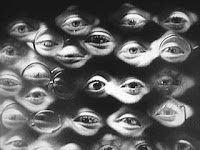Genre Analysis
Experimental Film Genre Analysis
The basic genres of film include Fiction and Documentary, which then include subgenres such as Drama and Thrillers, these subgenres then have similar conventions within it, for a film noir, for example, it is the detective and the femme fatale. These subgenres all have similar styles and techniques to them as well, such as flashbacks in film noir. However, there is a third main genre and that is the Avant-Garde or experimental film, as distinguished by Alan Williams.Experimental film allows a film-maker to change these conventions and with that change our perception of what those conventions make us think and feel. Other times it is used to help amateur film makers come into commercial film making or just test out new technology and letting the entertainment and revenue take a backseat. Experimental film often changes the micro features of film and the conventions connected with it to make the relationship between spectator and film more thoughtful and active, making the viewer search for the meaning. It can also help protest about mainstream movements in the art form.
This more engaged relationship allows experimental film to be polysemic as I may see something completely different in Nothing But Hours (Rien que les heures) compared to someone on the street, or there may be no meaning at all. The issue with this Polysemic ideology around experimental film means that, because there is not one singular meaning that one can grasp, that we can not fully understand what that Film maker intended the meaning to be because no-one has one definitive explanation behind the film, which can then make the film possibly loose its actual meaning.
 |
| Still from Nothing But Hours |
The political/protesting part of experimental film allows other artists to show their concern with how an artform may be growing in a mainstream sense, for example the French Lettrist movement in the 1950s, revolting against the popular films at the time, with Ultra-Lettrists announcing the death of cinema. Another time this rejection occurred was with Dog Star Man from 1961-64 when rejecting the mass American culture during that time.
Experimental Film-Makers really try to push the art form to the limit, or is some cases, break that boundary and create a new meaning in cinema. From moving away from the narrative and changing the narrative to making the whole film more abstract meaning, which creates a bigger crisis when trying to define an experimental film. By breaking film down to its bare essentials, like time and the frame, one can explore the deeper meaning inside the art form
In conclusion, experimental film allows an artist to break the boundary's and moulds created by the mainstream film makers to create something fresh, new and full of meaning but may loose it's true meaning out of trying to be too artistic or not artistic enough, meaning viewers may not understand a film at all or may create too many meanings from it.
Final Word Count: 488

Comments
Post a Comment